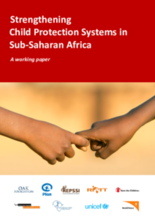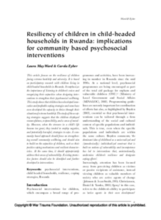Displaying 1331 - 1340 of 1617
This paper combines qualitative research with three micro data sets and finds that the presence of urban basic services is importantly linked to child residence of migrant parents.
This document outlines an overarching National Health Policy for Zambia.
This paper is a response to the increasing need for agreement on approaches and documented evidence of good practices consistent with system strengthening work. The purpose of the Inter-Agency Working Paper is to consolidate current thinking, examples and lessons learned about child protection system strengthening in sub-Saharan Africa and suggest a way forward.
Research was conducted in five Rift Valley towns in Kenya in 2011 to understand the link between emergencies and the perceived increase of children joining the streets. Findings show that emergencies such as Post Election Violence and drought have caused children to join the streets. By far the biggest reason for children joining the streets was food insecurity. The authors advocate for an urgent, large-scale response to place children currently connected to the streets in durable situations in tandem with a multi-sectorial development approach to tackle and address the root of the crisis.
This mapping and assessment report of Malawi’s Child Protection System offers key recommendations to strengthen the child protection system, including enforcing legislation, coordinating mechanisms, building capacity of the social service workforce, harmonization of child protection services, and strengthening accountability mechanisms.
Retrak’s technical brief on family reintegration for children living on the streets, acknowledges the difficulties which street children face at home and on the streets. But it also demonstrates that successful family reintegration is possible for street children when there is a focus on the individual child, building positive attachments with care-givers, strengthening families capabilities and involving the wider community.
Based on participatory research with children living in child headed households in Rwanda, this article focuses on the resilience of children facing extreme hardship and adversity. While the research focuses on child headed households, this study’s findings can be considered more broadly for interventions for other vulnerable children to support their development of innovative coping strategies.
Retrak is a UK based charity that works with street associated children in Africa to give them a real alternative to life on the street. The following success stories of outreach and reintegration show a promising model for children globally.
This discussion paper puts forward a set of lessons learned and recommendations for referral mechanisms and case management for vulnerable children in the Eastern and Southern Africa region (ESAR).
This study from CESVI examines the magnitude and characteristics of child labor in Kenya, particularly the “worst forms of child labour (WFCL) in Kenya,” with a focus on the urban context of Nairobi and on the rural context of the Nyanza province.








